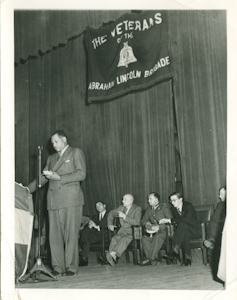“The artist must elect to fight for freedom or for slavery. I have made my choice. I had no alternative.” – Paul Robeson, 1937.
 The African-American Paul Robeson, a large man with a deep voice, achieved great distinction as an athlete, singer, actor, scholar, and supporter of social justice. Born in Princeton, New Jersey, Robeson graduated from Rutgers University with honors. He excelled in sports (All-American in football). He graduated from Columbia Law School in 1923 and married Eslanda Cordozo Goode. He won fame as an actor on stage and screen. In the popular musical Showboat, Robeson sang “Ol’ Man River.”
The African-American Paul Robeson, a large man with a deep voice, achieved great distinction as an athlete, singer, actor, scholar, and supporter of social justice. Born in Princeton, New Jersey, Robeson graduated from Rutgers University with honors. He excelled in sports (All-American in football). He graduated from Columbia Law School in 1923 and married Eslanda Cordozo Goode. He won fame as an actor on stage and screen. In the popular musical Showboat, Robeson sang “Ol’ Man River.”
The rise of fascism in Europe in the 1930s awakened Robeson’s political activism. He sang benefit concerts to assist Jewish refugees from Hitler’s Germany and to support Spain’s democracy during the Spanish Civil War. His mounting concern over fascist Germany’s and Italy’s direct support of the Spanish insurgents, and the western democracies’ refusal to assist the legitimate government, led him to visit the war-torn country in January 1938. He called his 1938 trip to Spain “a major turning point in my life.”He became an outspoken critic of U.S. segregation and lynching. In 1939, he recorded “Ballad for Americans,” a work that celebrated diversity and multiculturalism.
Robeson’s demand for equality and his opposition to the Cold War in the 1940s angered conservatives, who called Robeson a Communist. His refusal to be silent led to violent attacks at a concert in Peekskill, New York, in 1949. His criticism of the Korean War led the U.S. government to revoke his passport (later overturned by the Supreme Court), which limited his travels until 1956. He died after a long illness at the age of 77.
To learn more about Paul Robeson, see our bibliography.